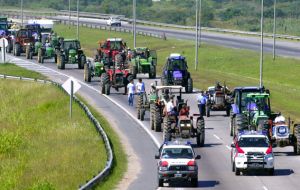MercoPress. South Atlantic News Agency
Argentine farmers begin Friday seven-day trading strike
 A familiar sight: strike pickets in Argentine routes
A familiar sight: strike pickets in Argentine routes Argentine farmers’ organizations announced Tuesday another national trading stoppage to protest President Cristina Fernandez de Kirchner administration camp policies particularly taxes on grains and oilseeds exports.
The strike, the third so far this year and the eighth since the beginning of the conflict in March 2008 is scheduled to last seven days starting Friday midnight. During that time there will be no trading of grains or oilseeds for industry or export and no livestock will be sent to markets.
The decision was taken Tuesday during a meeting of the liaison group which represents Argentina’s four main organizations with a membership estimated in almost 290.000 farmers.
“Let’s hope that the new protest limiting farm trading helps the government to re-capacitate and reflect about the decisions it has been adopting”, said Carlos Garetto the spokes person for the liaison group.
The stoppage decision follows President Cristina Kirchner’s veto to a farm emergency bill approved last week by Congress, on her government’s initiative, but which included the elimination of export taxes for certain counties of the province of Buenos Aires.
Export taxes on soybeans, sun flower, wheat, corn and on beef and dairy produce are at the heart of the conflict between the Kirchner couple administration and farmers organizations.
When windfall earnings and as part as a contribution to Argentina’s recovery following the melt down of the economy in 2002, farmers organizations accepted paying export levies, but in the last two years with the normalization of commodities prices, and costs catching up, the taxes have turned several crops money losers.
Such is the case that Argentina is forecasted will have to import wheat, beef and fresh milk sometime in the next 18 months because of the drastic contraction in the production of those basic items.
The government refuses to lower the taxes because it desperately needs the revenue to balance a bloated budget with billions of dollars spent in subsidies for transport, fuel and cheap food.
Garetto said that the emergency bill approved in Congress would have given farmers some “breathing space” from the almost two-year drought that has punished central Argentina, but the veto was “just the very end of this long dispute”.
Garetto added that farmers’ were most disappointed because following the meeting with several cabinet ministers on July 31st, “we have received no replies to all our proposals to help alleviate the serious situation of the Argentine camp”.
He also anticipated that once the seven day strike is over, we will keep to our “protest plan” and assess what further steps must be taken.
Argentina once the breadbasket of the world has seen its annual crop plunge dramatically following the 18 months dispute between farmers and the Kirchner couple who are intent in “making the rich landowners pay taxes to help finance the poor city dwellers”.
The confrontation has had two peak events: July last year when Congress repealed a further increase in export taxes and last June 28th, when the Kirchner couple lost their comfortable majority in Congress following mid term elections.
However since the new lawmakers will not be sworn in until next December 10, Kirchner is forcing through Congress, taking advantage of a divided opposition, legislation to support his wife’s administration.




Top Comments
Disclaimer & comment rulesCommenting for this story is now closed.
If you have a Facebook account, become a fan and comment on our Facebook Page!